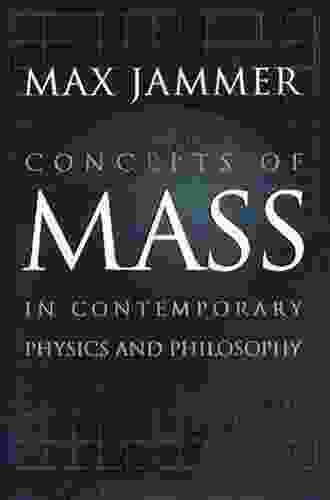Concepts of Mass in Contemporary Physics and Philosophy

Mass is a fundamental concept in physics, representing the amount of matter or energy contained within an object. It plays a crucial role in gravitational interactions, determining the strength of the gravitational force between objects. Historically, mass has been understood as a constant and invariant property of matter, but advancements in contemporary physics have challenged this traditional view.
5 out of 5
| Language | : | English |
| File size | : | 3137 KB |
| Screen Reader | : | Supported |
| Print length | : | 176 pages |
This article explores the evolving concepts of mass in contemporary physics and philosophy. We will delve into the gravitational, relativistic, and quantum mechanical aspects of mass and examine their implications for our understanding of the universe. Along the way, we will encounter mind-boggling paradoxes, thought-provoking philosophical questions, and the latest scientific discoveries that are reshaping our understanding of this fundamental property.
Gravitational Mass
The most familiar concept of mass is gravitational mass, which determines the strength of an object's gravitational field. According to Newton's law of universal gravitation, the gravitational force between two objects is directly proportional to the product of their masses. This means that objects with greater mass exert stronger gravitational forces than objects with less mass.
Gravitational mass is a scalar quantity, meaning it has only magnitude and not direction. It is also an additive quantity, meaning the total gravitational mass of a system is simply the sum of the gravitational masses of its constituents.
Relativistic Mass
Einstein's theory of special relativity introduced a new concept of mass, known as relativistic mass. Relativistic mass is the mass of an object as measured by an observer in relative motion to the object. It is always greater than the object's rest mass, which is the mass of the object when it is at rest relative to the observer.
The relativistic mass of an object increases with its velocity, approaching infinity as the object approaches the speed of light. This has profound implications for our understanding of the universe, as it means that objects with large velocities have more energy and are harder to accelerate than objects with low velocities.
Quantum Mass
Quantum mechanics, the theory that describes the behavior of matter at the atomic and subatomic level, has also challenged our traditional understanding of mass. In quantum mechanics, mass is not a constant property but rather a dynamic quantity that can fluctuate over time.
The uncertainty principle, a fundamental principle of quantum mechanics, states that the more precisely we know an object's momentum, the less precisely we can know its position. This means that the mass of an object can only be known with a certain degree of uncertainty.
Mass in Cosmology
The concept of mass plays a central role in cosmology, the study of the universe as a whole. The total mass of the universe, known as the cosmic mass, determines the curvature of spacetime and the expansion rate of the universe.
Observations indicate that the universe is dominated by dark matter, a mysterious form of matter that does not interact with electromagnetic radiation. Dark matter is believed to account for about 85% of the total mass of the universe, while visible matter, such as stars and galaxies, accounts for only about 15%.
Philosophical Implications
The evolving concepts of mass in contemporary physics have profound implications for our philosophical understanding of the universe. The traditional view of mass as a constant and invariant property of matter has been replaced by a more dynamic and relativistic view.
This has led to new philosophical questions about the nature of mass, its relation to energy, and its role in the fundamental laws of physics. Some philosophers argue that mass is not a fundamental property, but rather an emergent property that arises from the interactions of more fundamental particles or fields.
The concept of mass is a rich and multifaceted one that has played a central role in the development of physics and cosmology. From the gravitational mass that determines the strength of gravitational forces to the relativistic mass that increases with velocity to the quantum mass that fluctuates over time, the concept of mass has evolved over time to reflect our deepening understanding of the universe.
The ongoing study of mass in contemporary physics and philosophy promises to provide even more insights into the fundamental nature of reality. As we continue to probe the depths of the universe, we may come to a more complete understanding of the role of mass in shaping the cosmos.
5 out of 5
| Language | : | English |
| File size | : | 3137 KB |
| Screen Reader | : | Supported |
| Print length | : | 176 pages |
Do you want to contribute by writing guest posts on this blog?
Please contact us and send us a resume of previous articles that you have written.
 Fiction
Fiction Non Fiction
Non Fiction Romance
Romance Mystery
Mystery Thriller
Thriller SciFi
SciFi Fantasy
Fantasy Horror
Horror Biography
Biography Selfhelp
Selfhelp Business
Business History
History Classics
Classics Poetry
Poetry Childrens
Childrens Young Adult
Young Adult Educational
Educational Cooking
Cooking Travel
Travel Lifestyle
Lifestyle Spirituality
Spirituality Health
Health Fitness
Fitness Technology
Technology Science
Science Arts
Arts Crafts
Crafts DIY
DIY Gardening
Gardening Petcare
Petcare Brad Rock
Brad Rock Noah Michaud
Noah Michaud Jorge Luis Delgado
Jorge Luis Delgado Ron Elbe
Ron Elbe Jose Antonio Fernandez
Jose Antonio Fernandez Jeff Wiltse
Jeff Wiltse Rich Froning
Rich Froning Frederick J Gravetter
Frederick J Gravetter Adrienne Engleman Pga Fellow Professional
Adrienne Engleman Pga Fellow Professional Christina Cimorelli
Christina Cimorelli Konstantinos Mylonas
Konstantinos Mylonas Amy Kovarick
Amy Kovarick Alex Aster
Alex Aster Archie Brain
Archie Brain Eliane Kurbegov
Eliane Kurbegov Gene Hill
Gene Hill Mark Cucuzzella
Mark Cucuzzella Lakshya Trivedi
Lakshya Trivedi Ken Dehart
Ken Dehart Meganne Forbes
Meganne Forbes Bobbie Ziemer
Bobbie Ziemer Joseph A Durlak
Joseph A Durlak Harper Paris
Harper Paris Gerry Giovinco
Gerry Giovinco Anita Shreve
Anita Shreve Peter Shirley
Peter Shirley Kathy Toney
Kathy Toney Todd Whitaker
Todd Whitaker Peter Wayne
Peter Wayne Christina Shelley Albrecht
Christina Shelley Albrecht Adelheid A M Nicol
Adelheid A M Nicol Simon Needham
Simon Needham Michelle Reid
Michelle Reid Kevin Greene
Kevin Greene Ben Marcus
Ben Marcus C W Ceram
C W Ceram Adele Westbrook
Adele Westbrook E Lockhart
E Lockhart Marty Ofonagoro
Marty Ofonagoro Barry Brown
Barry Brown Brian K Jones
Brian K Jones Terri Paajanen
Terri Paajanen Afra J Zomorodian
Afra J Zomorodian Si Robertson
Si Robertson Adam Schupak
Adam Schupak Michael Kerrisk
Michael Kerrisk Team Golfwell
Team Golfwell Zainab Yate
Zainab Yate Jeff Wallach
Jeff Wallach Leigh Bardugo
Leigh Bardugo Heather Worthington
Heather Worthington Tessa Bielecki
Tessa Bielecki Andrew Beyer
Andrew Beyer Adrian Bejan
Adrian Bejan Hans Reichenbach
Hans Reichenbach Erin Eileen Leigh
Erin Eileen Leigh Lisa Mosconi
Lisa Mosconi Loren Cordain
Loren Cordain Mike Jacker
Mike Jacker Bruce Hood
Bruce Hood Alicia Young
Alicia Young Dan Fagin
Dan Fagin Brian J Lang
Brian J Lang Jason Browne
Jason Browne Elizabeth Carman
Elizabeth Carman John Muir
John Muir Bridget Bishop
Bridget Bishop Fred Luskin
Fred Luskin John D Mccann
John D Mccann Paul Embrechts
Paul Embrechts Bruce Rosenfeld
Bruce Rosenfeld Robin Suerig Holleran
Robin Suerig Holleran C S Pacat
C S Pacat Anita Bean
Anita Bean Cameo Renae
Cameo Renae Harry Pearson
Harry Pearson Heather D Yates
Heather D Yates Alexandra Christo
Alexandra Christo Helen Scheuerer
Helen Scheuerer Kenneth Martz
Kenneth Martz Mildred Johnson
Mildred Johnson Marc Roche
Marc Roche Kara Powell
Kara Powell Don Webb
Don Webb Hannes Wessels
Hannes Wessels James Lovelock
James Lovelock Ilene Skeen
Ilene Skeen Emily Larson
Emily Larson Kevin Biggar
Kevin Biggar Melvin Konner
Melvin Konner Aubre Tompkins Cnm
Aubre Tompkins Cnm Dwayne Bryant
Dwayne Bryant Adrian Lobley
Adrian Lobley Gary Dean Quesenberry
Gary Dean Quesenberry Tony Grice
Tony Grice Julie Gore
Julie Gore Carmen Juncal
Carmen Juncal John Martin Taylor
John Martin Taylor Joshua Baker
Joshua Baker Peggy Tharpe
Peggy Tharpe Christopher Pike
Christopher Pike Alvin Boyd Kuhn
Alvin Boyd Kuhn Steve Mchugh
Steve Mchugh Asrai Devin
Asrai Devin Doki Cohen
Doki Cohen Marta Alexander
Marta Alexander Max Jammer
Max Jammer Mona Liza Santos
Mona Liza Santos Julia V Taylor
Julia V Taylor Philip Striano
Philip Striano Phil Cousineau
Phil Cousineau David Churchman
David Churchman Rod Heckelman
Rod Heckelman Bob Forsch
Bob Forsch Eric Adelson
Eric Adelson Jordan Bone
Jordan Bone Andrea Ros
Andrea Ros Khalid Khashoggi
Khalid Khashoggi Adib Khorram
Adib Khorram Slavka Bodic
Slavka Bodic Heather Lende
Heather Lende Ursula Goodenough
Ursula Goodenough Shawn Thornton
Shawn Thornton Michael H Lubetsky
Michael H Lubetsky Amy Racina
Amy Racina Susan Garcia
Susan Garcia Afrodite Rossini
Afrodite Rossini Agatha Christie
Agatha Christie Suzanne Swedo
Suzanne Swedo Melanie Mitchell
Melanie Mitchell Gina Fava
Gina Fava Adam Ploszaj
Adam Ploszaj Dorothy Hamill
Dorothy Hamill Adrienne Mayor
Adrienne Mayor James Mcdougall
James Mcdougall Dale F Bloom
Dale F Bloom Lynne Kelly
Lynne Kelly Thomas E Gilson
Thomas E Gilson Nelson L Schuman
Nelson L Schuman Kendare Blake
Kendare Blake C K Murray
C K Murray Adam Woodbeck
Adam Woodbeck Adrienne Tooley
Adrienne Tooley Mick Dolan
Mick Dolan Kirsten Watson
Kirsten Watson John Feinstein
John Feinstein Kathy A Zahler
Kathy A Zahler Kirk Deeter
Kirk Deeter Aditya Chatterjee
Aditya Chatterjee Suzy Giordano
Suzy Giordano Dirk Baker
Dirk Baker Scott B Williams
Scott B Williams David Graeber
David Graeber Adam Shaw
Adam Shaw Annie Gilbert Coleman
Annie Gilbert Coleman Brittany Konsella
Brittany Konsella Tim Wise
Tim Wise Adele Jones
Adele Jones Issendai Bechau
Issendai Bechau Ari Marmell
Ari Marmell Jacqueline Houtman
Jacqueline Houtman Adam Shoalts
Adam Shoalts Joe Varady
Joe Varady Mayuri Saxena
Mayuri Saxena Mickey Royal
Mickey Royal Yuu Tanaka
Yuu Tanaka Walter Rhein
Walter Rhein David A Whitsett
David A Whitsett Paul Parker
Paul Parker Peter L Bernstein
Peter L Bernstein Adam Raider
Adam Raider Gianni Filippini
Gianni Filippini Mihaly Csikszentmihalyi
Mihaly Csikszentmihalyi Veronica Strang
Veronica Strang The Times Mind Games
The Times Mind Games Linus Wilson
Linus Wilson Adrian Wallwork
Adrian Wallwork Laura Fuentes
Laura Fuentes Karl Sigmund
Karl Sigmund Adele Faber
Adele Faber Baby Professor
Baby Professor Collins Easy Learning
Collins Easy Learning Colin Pask
Colin Pask Herbert L Roitblat
Herbert L Roitblat Liao Yiwu
Liao Yiwu Martin Dorey
Martin Dorey J Lynn Bailey
J Lynn Bailey Darrell Huff
Darrell Huff Mark Bittman
Mark Bittman Mel Levine
Mel Levine David Mcraney
David Mcraney James P Lewis
James P Lewis James C Dobson
James C Dobson Adams Media
Adams Media Jo Deurbrouck
Jo Deurbrouck Richard J Larsen
Richard J Larsen Oscar Ratti
Oscar Ratti Don Nehlen
Don Nehlen Charles Dougherty
Charles Dougherty Edgar Giffenig
Edgar Giffenig Craig Wiggers
Craig Wiggers Andres Mooring
Andres Mooring Mark Matlock
Mark Matlock Amelia Simmons
Amelia Simmons Maurice Isserman
Maurice Isserman Moon Ho Jung
Moon Ho Jung Aenghus Chisholme
Aenghus Chisholme Dagogo Altraide
Dagogo Altraide Paul Weamer
Paul Weamer Melinda Folse
Melinda Folse Barbara Mertz
Barbara Mertz Max Mason
Max Mason Yusra Mardini
Yusra Mardini Sarah Stillman
Sarah Stillman P Brian Noble
P Brian Noble Jenny Jones
Jenny Jones Larry Clay
Larry Clay Sergei Urban
Sergei Urban Shmuel Goldberg
Shmuel Goldberg Johnathon Allen
Johnathon Allen Wayne Curtis
Wayne Curtis Barry Glassner
Barry Glassner Adiba Jaigirdar
Adiba Jaigirdar Timothy Leffel
Timothy Leffel Afsaneh Moradian
Afsaneh Moradian Marcus Heerdt
Marcus Heerdt Joe Harkness
Joe Harkness Malachi Martin
Malachi Martin Charles R Swindoll
Charles R Swindoll Wendy Heard
Wendy Heard Kosol Ouch
Kosol Ouch Robert C Renneberg
Robert C Renneberg Gregory Curtis
Gregory Curtis Jess Thomson
Jess Thomson Jonathan Kozol
Jonathan Kozol Julie Mohan
Julie Mohan Alisscia B
Alisscia B Terrence W Deacon
Terrence W Deacon Amby Cooper
Amby Cooper Jd Richey
Jd Richey Joseph Pred
Joseph Pred Marta Szabo
Marta Szabo Balazs Csigi
Balazs Csigi Kate Wickers
Kate Wickers Cindy Nana Parente
Cindy Nana Parente S Yates
S Yates Carol Grbich
Carol Grbich Tim Hodkinson
Tim Hodkinson James Goi Jr
James Goi Jr Natalie Guenther
Natalie Guenther Adrian Bardon
Adrian Bardon Renato Rosaldo
Renato Rosaldo Letitia Baldrige
Letitia Baldrige D J Conway
D J Conway Douglas H Macdonald
Douglas H Macdonald Meg Cox
Meg Cox Carl Johan Calleman
Carl Johan Calleman Susan Rovezzi Carroll
Susan Rovezzi Carroll Ayelet Fishbach
Ayelet Fishbach Ken Robinson
Ken Robinson Zhongwen Fu
Zhongwen Fu Normandi Ellis
Normandi Ellis Paul L Wachtel
Paul L Wachtel Robyn Wideman
Robyn Wideman Bonnie Raingruber
Bonnie Raingruber Adriana Rabinovich
Adriana Rabinovich Sun Yung Shin
Sun Yung Shin Michael J Domitrz
Michael J Domitrz Michael Bronski
Michael Bronski Robin L Rielly
Robin L Rielly Susannah Cahalan
Susannah Cahalan Jake Schafft
Jake Schafft John Passmore
John Passmore Chuck Mckeever
Chuck Mckeever Lindsay Burton
Lindsay Burton Taylor Markarian
Taylor Markarian Louisa J Morgan
Louisa J Morgan Mary Roach
Mary Roach John D Whidden
John D Whidden George Yule
George Yule Kamala Harris
Kamala Harris Rick Sapp
Rick Sapp Kieran Higgins
Kieran Higgins Stephen Tignor
Stephen Tignor Kathryn Casey
Kathryn Casey Ed Hanczaryk
Ed Hanczaryk Fergus Connolly
Fergus Connolly Adam Stevenson
Adam Stevenson Helen Xander
Helen Xander Daniel Sobieck
Daniel Sobieck Alexi Pappas
Alexi Pappas George Makari
George Makari Lori Bregman
Lori Bregman Rebecca Lowe
Rebecca Lowe Stephen Brennan
Stephen Brennan Warwick Rodwell
Warwick Rodwell Agnes Light
Agnes Light Cynthia A Robertson
Cynthia A Robertson Scott O Dell
Scott O Dell Adrian Wilson
Adrian Wilson Adharanand Finn
Adharanand Finn Jane M Healy
Jane M Healy Noson S Yanofsky
Noson S Yanofsky Max Porter
Max Porter Andrea Huneeus Vergara
Andrea Huneeus Vergara Frank Delaney
Frank Delaney Adam Serwer
Adam Serwer Nomi Prins
Nomi Prins Basil Pickard
Basil Pickard Timothy Malcolm
Timothy Malcolm Valerie Melvin
Valerie Melvin Katarzyna Wac
Katarzyna Wac Thomas Pranio
Thomas Pranio Mary Ann Drummond
Mary Ann Drummond Dr Paul Lam
Dr Paul Lam Vedant J Maheshwari
Vedant J Maheshwari Elizabeth De Zulueta
Elizabeth De Zulueta Peter Marshall
Peter Marshall Kevin Van Whye
Kevin Van Whye Jasmine Taylor
Jasmine Taylor Boy Scouts Of America
Boy Scouts Of America Danny Wuerffel
Danny Wuerffel Sam Fadala
Sam Fadala Herb Carnegie
Herb Carnegie Leslie T Chang
Leslie T Chang Kim Gosselin
Kim Gosselin Lily Luchesi
Lily Luchesi Michael Mcteigue
Michael Mcteigue Allen Hedrick
Allen Hedrick Ahmad Al Sukaini
Ahmad Al Sukaini American Alpine Club
American Alpine Club Adam Weymouth
Adam Weymouth Jenna Parker
Jenna Parker Heidi Dusek
Heidi Dusek Zoe Clark Coates
Zoe Clark Coates Nastassja Martin
Nastassja Martin Michele Angello
Michele Angello Pete Jordan
Pete Jordan John Hillman
John Hillman Tom Ryan
Tom Ryan Haym Kruglak
Haym Kruglak Frank C Keil
Frank C Keil Myatt Murphy
Myatt Murphy Deborah Grace White
Deborah Grace White Adrian Smith
Adrian Smith Karen Weekly
Karen Weekly Alvin E Roth
Alvin E Roth Gena Showalter
Gena Showalter Alexandra Horowitz
Alexandra Horowitz Joan Naidorf
Joan Naidorf John Shelton Reed
John Shelton Reed Michael Brooks
Michael Brooks Joanne Jamrosz
Joanne Jamrosz Libbi Palmer
Libbi Palmer Daniel Kahneman
Daniel Kahneman Seth Berkman
Seth Berkman Gary R Miller
Gary R Miller Brad Borkan
Brad Borkan Shelley Metten M S Ph D
Shelley Metten M S Ph D Alondra Nelson
Alondra Nelson Joe Posnanski
Joe Posnanski Matt Morton
Matt Morton Nicole Spindler
Nicole Spindler Elias Johnson
Elias Johnson Karen J Bun
Karen J Bun Adam Pertman
Adam Pertman Greg Wyshynski
Greg Wyshynski Timothy J Baroni
Timothy J Baroni Adrian Wells
Adrian Wells Dennis Cassinelli
Dennis Cassinelli Lydia Kang
Lydia Kang Tony Herman
Tony Herman Darron L Clark
Darron L Clark Eric Orton
Eric Orton Adrian May
Adrian May Herbert Clyde Lewis
Herbert Clyde Lewis Jay Mcgraw
Jay Mcgraw Barry Melrose
Barry Melrose Stephen John Peel
Stephen John Peel Thich Nhat Hanh
Thich Nhat Hanh Leckie
Leckie Akilah Hughes
Akilah Hughes Nancy Mellon
Nancy Mellon Charles D Amico
Charles D Amico Luca Vargiu
Luca Vargiu Timothy D Wilson
Timothy D Wilson George A Morgan
George A Morgan Monique Boutsiv
Monique Boutsiv Joseph Bruchac
Joseph Bruchac Seymour Lipschutz
Seymour Lipschutz Frans X Plooij
Frans X Plooij George Sheehan
George Sheehan Eric Hoffer
Eric Hoffer Adrian Gonzales
Adrian Gonzales David Blatner
David Blatner Emily Ross
Emily Ross Doris J Barnes
Doris J Barnes Alex Tremm
Alex Tremm Christy Isbell
Christy Isbell Mariel Hemingway
Mariel Hemingway Ashley Bugge
Ashley Bugge Laura Zinn Fromm
Laura Zinn Fromm Rusty Richards
Rusty Richards Allie Duzett
Allie Duzett Bryan Willis
Bryan Willis Ken Jeremiah
Ken Jeremiah Michael D Rich
Michael D Rich Lucy Wolfe
Lucy Wolfe Adrienne Rawlinson
Adrienne Rawlinson David Sloan Wilson
David Sloan Wilson Supana Onikage
Supana Onikage Sam L Savage
Sam L Savage Nicholas Kardaras
Nicholas Kardaras Staci Frenes
Staci Frenes Saidiya V Hartman
Saidiya V Hartman Dr James Dinicolantonio
Dr James Dinicolantonio Nicole Bailey
Nicole Bailey Trisha Yearwood
Trisha Yearwood Joanna Warrington
Joanna Warrington Ahmed Hulusi
Ahmed Hulusi Shami Stovall
Shami Stovall Susan Adams
Susan Adams James B Marsh
James B Marsh Sherrie Nist Olejnik
Sherrie Nist Olejnik Philip Gardiner
Philip Gardiner Nicholas Carr
Nicholas Carr Gary Lonesborough
Gary Lonesborough Bettina Elias Siegel
Bettina Elias Siegel Kevin J Cheek
Kevin J Cheek Elizabeth Parker
Elizabeth Parker Adrian Li
Adrian Li John Graves
John Graves Isabella Rotman
Isabella Rotman Richard Ray
Richard Ray Trevor Rowley
Trevor Rowley Debra D Sullivan
Debra D Sullivan Patrick Hutchinson
Patrick Hutchinson M Barlow Pepin
M Barlow Pepin Michael S Weisbach
Michael S Weisbach Marissa Anderson
Marissa Anderson Jeff Hutton
Jeff Hutton Robin Jones Gunn
Robin Jones Gunn Jennifer Justus
Jennifer Justus Ademar Aguiar
Ademar Aguiar Avner Ash
Avner Ash Jack Heinowitz
Jack Heinowitz Timothy Gowers
Timothy Gowers Zachery Knowles
Zachery Knowles Agnieszka Latocha
Agnieszka Latocha Jacqueline Winspear
Jacqueline Winspear Angel Millar
Angel Millar Philip Maffetone
Philip Maffetone Pearl S Buck
Pearl S Buck Claire Heffron
Claire Heffron Ae Marling
Ae Marling V C Andrews
V C Andrews Greg Guest
Greg Guest Aftab Hamid
Aftab Hamid Sarah Clarkson
Sarah Clarkson Jeff Van West
Jeff Van West Marie Colvin
Marie Colvin Amy Blakeslee
Amy Blakeslee Gerry Lopez
Gerry Lopez Duffy Gaver
Duffy Gaver Spike Walker
Spike Walker Adam Rutherford Phd
Adam Rutherford Phd John North
John North Meghan Mccarthy Mcphaul
Meghan Mccarthy Mcphaul Adrienne Young
Adrienne Young Master Sajid Ahmed
Master Sajid Ahmed William Smith
William Smith John Nero
John Nero Amy Bartelloni
Amy Bartelloni Tina L Quick
Tina L Quick Robert Stone
Robert Stone Natania Barron
Natania Barron Susy Lee
Susy Lee John Vaillant
John Vaillant Tommy Caldwell
Tommy Caldwell Elias M Stein
Elias M Stein Sylvia Nasar
Sylvia Nasar Rachel Ormston
Rachel Ormston
Light bulbAdvertise smarter! Our strategic ad space ensures maximum exposure. Reserve your spot today!
 Giovanni MitchellFollow ·8k
Giovanni MitchellFollow ·8k Duane KellyFollow ·8k
Duane KellyFollow ·8k Jaylen MitchellFollow ·3k
Jaylen MitchellFollow ·3k Octavio PazFollow ·13.7k
Octavio PazFollow ·13.7k Dillon HayesFollow ·14.2k
Dillon HayesFollow ·14.2k Scott ParkerFollow ·4.7k
Scott ParkerFollow ·4.7k Graham BlairFollow ·5.9k
Graham BlairFollow ·5.9k Richard WrightFollow ·2.1k
Richard WrightFollow ·2.1k
 Cruz Simmons
Cruz SimmonsThe Ultimate Canadian Cookbook: A Culinary Exploration of...
Journey into the heart of Canadian cuisine...

 Grayson Bell
Grayson BellAn Initial Exploration Of The Diminishing Role Of Facts...
When we think of the digital age, we often...

 Jayden Cox
Jayden CoxHollywood Trainer's Real Guide to Getting the Body You've...
Achieving a fit and...

 Octavio Paz
Octavio PazGood Walk Spoiled: An Exploration of the Effects of...
Dogs are often hailed...

 Jerome Powell
Jerome PowellMuhammad Allah Ahmed Hulusi: A Visionary Scholar and...
Muhammad Allah Ahmed Hulusi...
5 out of 5
| Language | : | English |
| File size | : | 3137 KB |
| Screen Reader | : | Supported |
| Print length | : | 176 pages |














